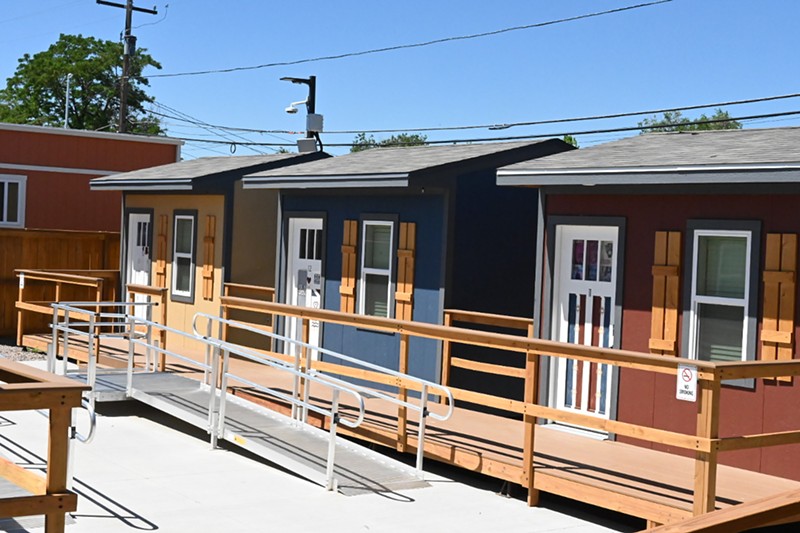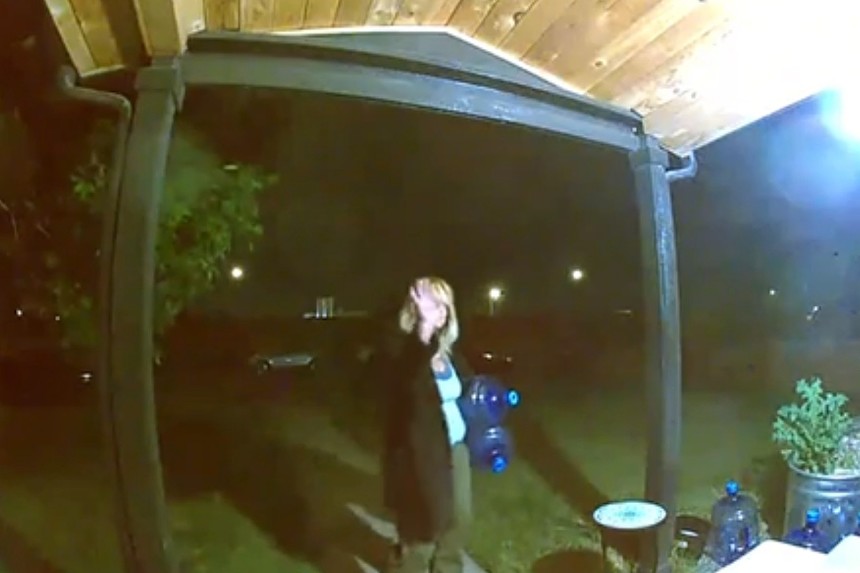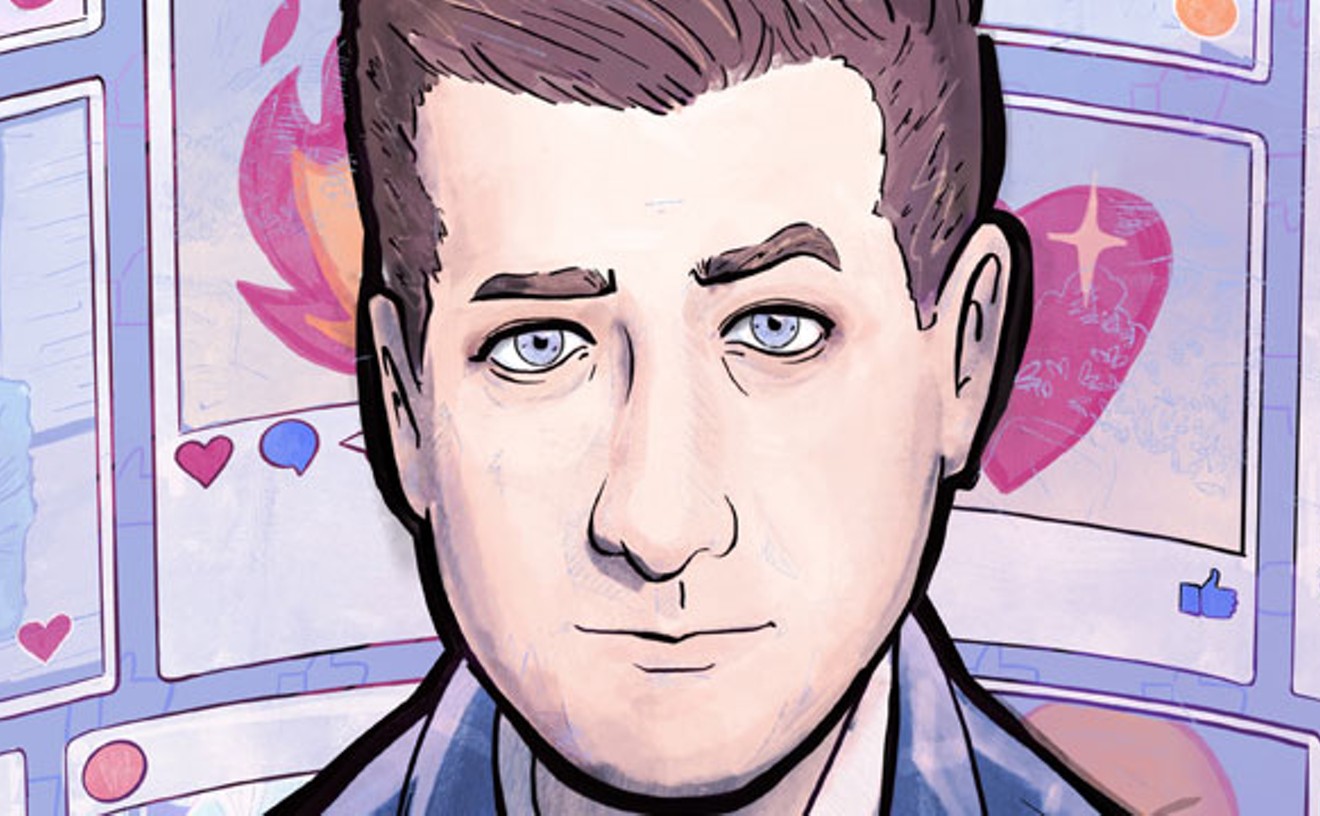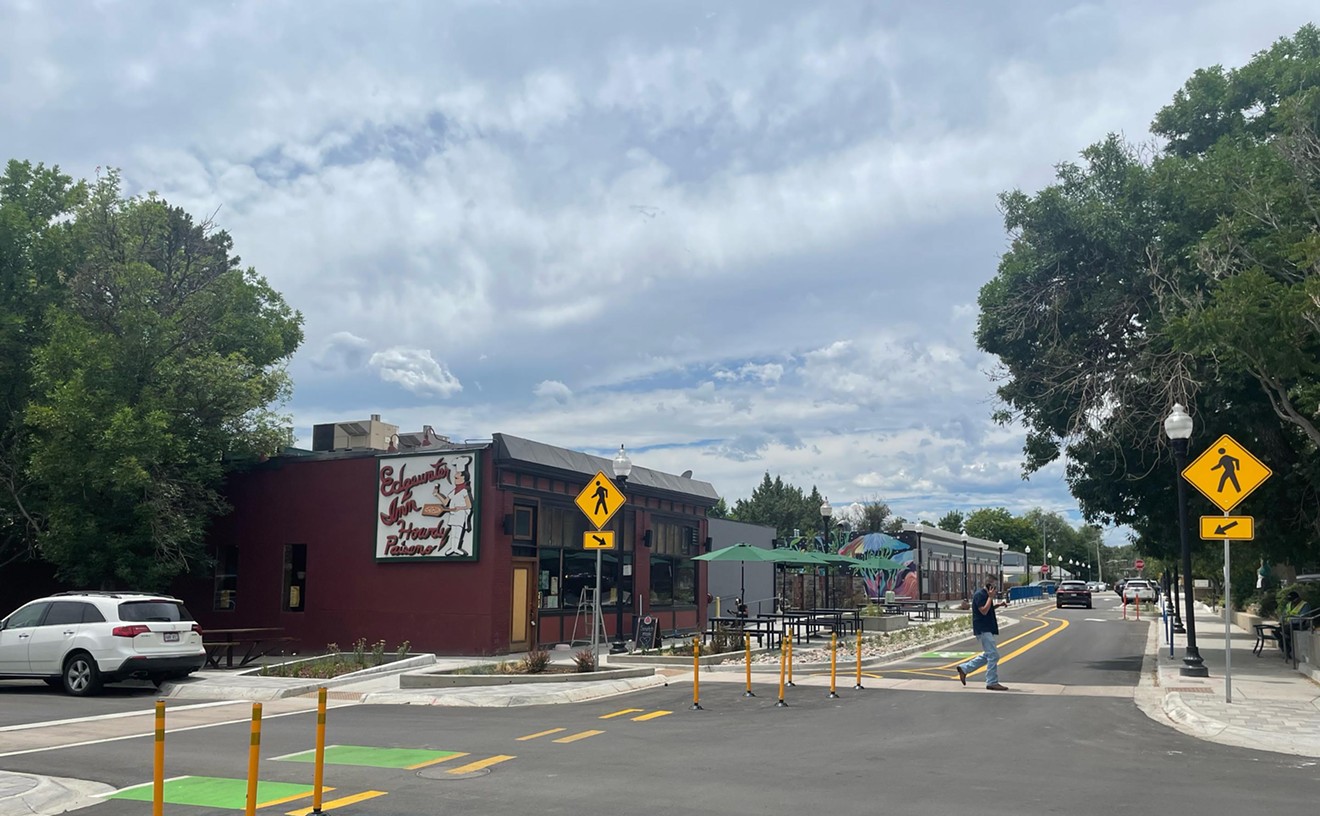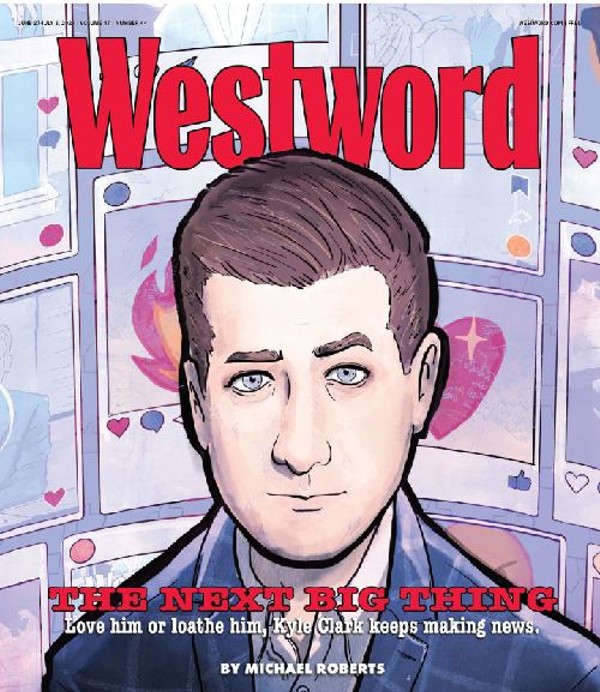"I was open to the idea. I was trying to learn, open to learning about the process," Overland resident Elias Egozi says. "We would like to see the homeless or the unhoused get the help they need. We knew when we rented that the community was going to be there. We didn't think it would be that bad."
Egozi owns nearby marijuana dispensary Alto, and moved into the Overland neighborhood in January. He liked the idea of the micro-community before it opened on March 11, but his feelings changed once he started having issues with homeless residents at his house after the opening of La Paz.
In April, Egozi found someone living in his shed, located behind his backyard fence, with blankets and pillows. Egozi says the stranger could have lived there for as long as a month. When he walks his dog at the park near the South Platte River, Egozi often sees people doing drugs "right at the entrance, not even hiding it."
His doorbell camera recently caught a woman stealing two water jugs and a couple of small decorative tables off his porch, then smiling and waving at the camera. Packages have been stolen from his front yard, too, he says.
In April, Egozi found someone living in his shed, located behind his backyard fence, with blankets and pillows. Egozi says the stranger could have lived there for as long as a month. When he walks his dog at the park near the South Platte River, Egozi often sees people doing drugs "right at the entrance, not even hiding it."
His doorbell camera recently caught a woman stealing two water jugs and a couple of small decorative tables off his porch, then smiling and waving at the camera. Packages have been stolen from his front yard, too, he says.
Police didn't do anything about the theft when he showed them the video, according to Egozi. He's not sure who to contact in the neighborhood about issues with the micro-community, and says he hasn't seen any security since it opened.
"There's nothing stopping them from doing what they want," he says.
Egozi doesn't think that micro-community residents are responsible for the theft and public drug use, but he says both have been increasing in Overland since it opened. "It could be them, it could be their buddies. I don't know," he says.
"It objectively makes it harder to live there," Egozi says of La Paz. "The problem is inherent in the concept: If you have a bunch of people living together, they're going to move around, and because of the people who live there, you have dangerous activity."
Jenn Greiving, the president of the Overland Park Neighborhood Association, describes feelings in the neighborhood as "mixed" toward the micro-community. She says that Egozi's experiences are "the reality of living in any city in the country" right now, though she admits she doesn't live immediately next to the micro-community.
"What I hear from neighbors are honestly mixed reviews," she says. "I've heard from people who say they don't feel safe, and then I've had people who say it's better than what used to be there, which was just the vacant lot with fires and trash and rats. And then I've had other people who say they don't even notice it's there."
An Overland resident since 1980, Jack Unruh says, "There's distress in the neighborhood about drug use," and neighbors don't know the best way to report it because they've "never accurately been informed about best practices for calling 311 and 911," he says.
Just off South Santa Fe Drive and West Evans Avenue, the La Paz micro-community currently houses about sixty homeless residents brought in through sweeps as part of Johnston's All In Mile High initiative. La Paz, which means "the peace" in Spanish, is run by the Colorado Village Collaborative and is considered Denver's largest micro-community.
Originally planned for 120 homeless residents, the size of La Paz shrank to sixty units in December after Councilwoman Flor Alvidrez, who represents the area, opposed a contract with CVC unless it agreed to a smaller size. The organization and the mayor's office wanted to open La Paz in December, but the contract and other hiccups delayed it until March.
Now that it's up and running, though, CVC leaders say they're noticing real momentum.
Early in the mayor's administration, micro-communities were touted as a central piece to the mission of solving homelessness in Denver. Although Johnston met his goal of housing 1,000 people in 2023, he opened only one micro-community that year — on the last day of the year — and relied more on expensive contracts to convert hotels into shelters. Just off South Santa Fe Drive and West Evans Avenue, the La Paz micro-community currently houses about sixty homeless residents brought in through sweeps as part of Johnston's All In Mile High initiative. La Paz, which means "the peace" in Spanish, is run by the Colorado Village Collaborative and is considered Denver's largest micro-community.
Originally planned for 120 homeless residents, the size of La Paz shrank to sixty units in December after Councilwoman Flor Alvidrez, who represents the area, opposed a contract with CVC unless it agreed to a smaller size. The organization and the mayor's office wanted to open La Paz in December, but the contract and other hiccups delayed it until March.
Now that it's up and running, though, CVC leaders say they're noticing real momentum.
Inside La Paz Micro-Community
Staff and residents at the micro-community tell Westword they're happy with how it has been running so far. Audri Griffin moved into La Paz in April after being swept from an encampment at Fourth Avenue and Kalamath Street in the Baker neighborhood. She was also swept from a large encampment in La Alma near Navajo Street and the Eighth Avenue overpass.
Griffin prefers the micro-community because "the staff is phenomenal, there's a lot more resources." At a city shelter converted from a former Comfort Inn, Griffin "never even came close to looking at a case manager," she says. At La Paz, she had a case manager after a couple of days.
Cuica Montoya, CVC senior director of homeless programs, and senior program director Hannah Dew say they've been transparent with Overland residents and are responding to their concerns.
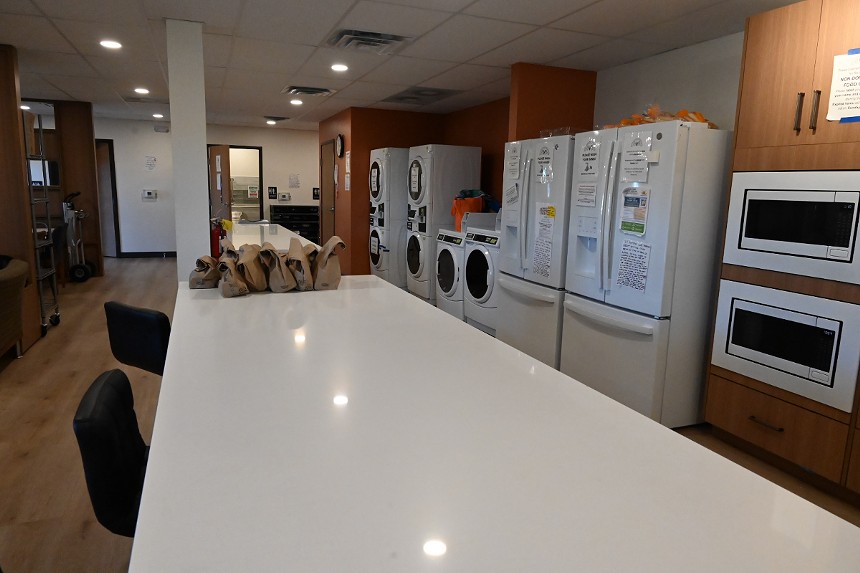 "They have been reaching out when they need something, and they've been communicating with us," Montoya says. "I think they're relatively pleased."
"They have been reaching out when they need something, and they've been communicating with us," Montoya says. "I think they're relatively pleased."
A good-neighbor committee includes representatives from CVC, the Denver Police Department, City Council District 7 and the Overland neighborhood, including Greiving and Unruh. That committee has met twice so far; Montoya says this is when CVC tries to work out issues with neighbors of La Paz. 
Two community centers in the La Paz micro-community offer homeless residents a bathroom and a kitchen, with three meals provided per day.
Bennito L. Kelty
"We look over the crime data, we look over the 311 data," she says. "We make sure they're fully informed and then go over complaints and concerns. We keep a log of phone calls that we get, emails that we get. We find that transparency is important in building neighborhood trust."
Without its own security officers, staff at La Paz are responsible for monitoring and reporting dangerous and criminal activity. A staff of about fifteen people is on site 24/7, according to CVC, including operational staff who walk through the surrounding neighborhood. Residents can come and go when they want.
Inside La Paz, the effort to get people on their feet is going as CVC hoped, staff say. A dozen residents "are actively working toward housing" by applying for vouchers, but none have moved into permanent housing yet, Montoya says. Neither CVC nor the City of Denver expected anyone to move into permanent housing this early into the site's opening, however.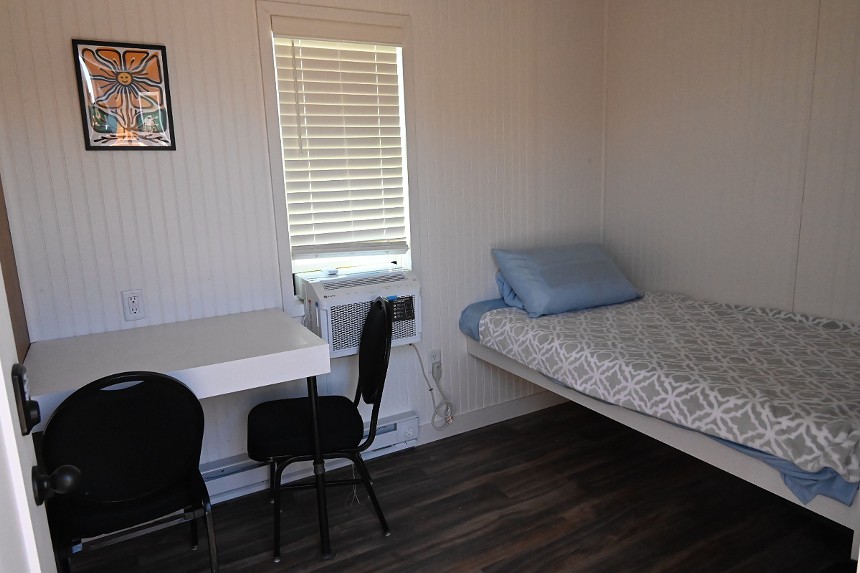
At the La Paz micro-community, everybody gets their own room, but no one is allowed in another person's room. One resident says this "cuts down on a lot of drama."
Bennito L. Kelty
"Successes are people getting vital documents they haven't had in years," Dew says. "People are building a community, people have connected with family, people have been able to pursue medical care because they're in a stable situation."
At least two La Paz residents have reconnected with their kids since moving in, according to CVC. Meanwhile, one resident has started medical treatment, two restored their veterans' benefits, and another earned their fork-lift certificate. Others have received job training, work clothes and bikes, and mobile clinics and libraries visit every week.
"That's what our case management and peer support are for, getting people the help they need," Dew says. "They are actively asking people's goals. They do a needs assessment on the first meeting...and then we help connect them."
Montoya says programs like these prevent recidivism into homelessness, but the micro-community has already seen some residents go back out onto the streets after getting kicked out of La Paz for violating rules.
CVC still hopes to expand the micro-community to 120 units when Denver City Council revisits its contract in the fall. The zoning permit for La Paz only gives the city until 2027 to use the space; after that the land returns to the state government.
"I hope the neighborhood feels good," Montoya says, "because I work really hard to build those relationships in each community that we're in. We want to be good neighbors."
"That's what our case management and peer support are for, getting people the help they need," Dew says. "They are actively asking people's goals. They do a needs assessment on the first meeting...and then we help connect them."
Montoya says programs like these prevent recidivism into homelessness, but the micro-community has already seen some residents go back out onto the streets after getting kicked out of La Paz for violating rules.
CVC still hopes to expand the micro-community to 120 units when Denver City Council revisits its contract in the fall. The zoning permit for La Paz only gives the city until 2027 to use the space; after that the land returns to the state government.

